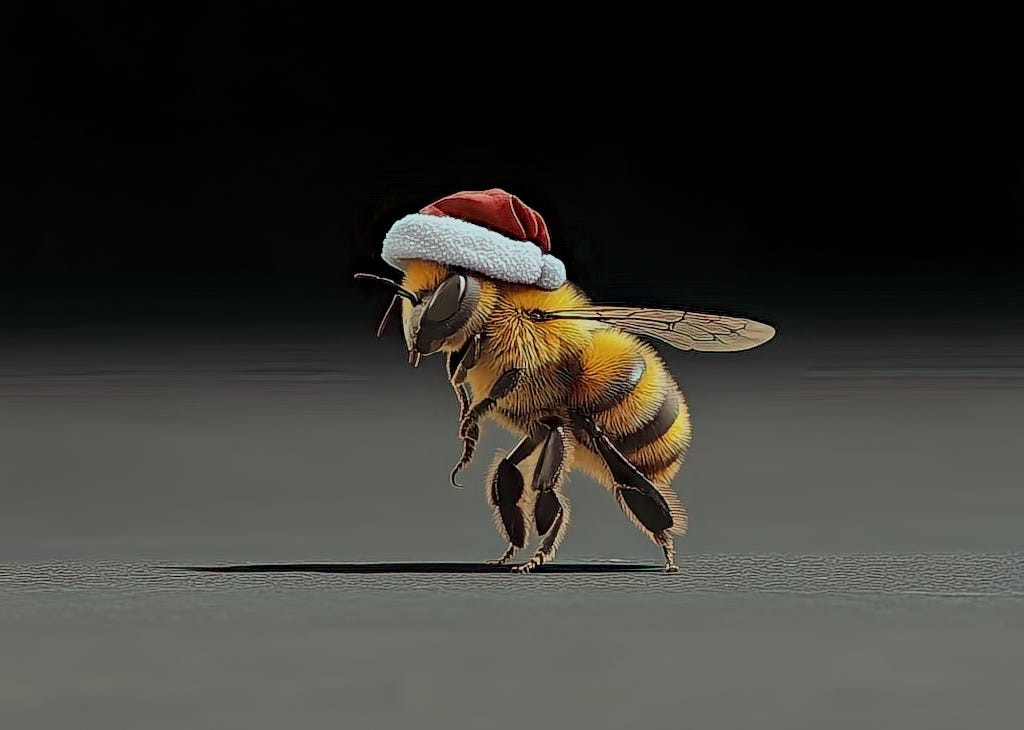We have to learn the art of stopping—stopping our thinking, our habit energies, our forgetfulness, the strong emotions that rule us. —Thich Nhat Hanh (1926-2022)
That’s a good subject to talk with your chiropractor about when you’re lying facedown on her adjustment table in an office adjoining a shopping complex as the December holidays approach—the art of stopping. It’s what happened to me yesterday.
I had already decided that, because of the hectic season, my next podcast would be a guided meditation listeners could use whenever they find themselves busily bee-ing and forgetting to simply be. Then Doc Misty said she had been thinking about the importance of stopping and found it hard to build even ten minutes a day into her busy schedule for meditation.
So, I’ll have her and people like her in mind as I lead this. I hope it’s useful for those newer to meditation and the more experienced listeners to From the Pure Land.
Before we begin, I’ll say a few words about Thay. That’s what his students call the venerable Buddhist monk Thich Nhat Hanh, who died in 2022 at the age of 95. That’s the Vietnamese word for “teacher.” It was my privilege to consider Thay my primary teacher for almost three decades and to have attended numerous in-person events with him, including a weeklong retreat in the mountains of Vermont.
If you’re unfamiliar with Thich Nhat Hanh, consider reading his classic book The Miracle of Mindfulness or anorther favorite of mine, Living Buddha, Living Christ.
That retreat in Vermont was held at the Ascutney Mountain Resort in the skiing off-season. The retreat organizers rented the place and hired a local catering firm to supply vegetarian meals. The caterers were given one unusual instruction. At every meal, the bell of mindfulness would be rung once or twice.

Thay’s students know what the sound of the bell means. When they hear it, they are asked to stop whatever they are doing (as long as they can do so safely), listen to the beautiful sound as it fades, focus on their breathing, and return fully to their “true home.” So the catering servers and kitchen staff were asked to do the same. At each meal, as the bell sounded, they would stop along with the rest of us. Sometimes, they’d stop in midstride holding a tray of food or empty plates.
At the retreat’s final meal, as we thanked the catering employees, they told us how much they enjoyed this new practice of stopping. So, I invite you now to find a comfortable, quiet spot to stop and breathe when you hear the sound of the bell. You might think:
Listen. Listen. This beautiful sound brings me back to my true home.
[Readers on Substack may listen to this section or click the “Transcript” tab for the text.]
Before ending the podcast, I’ll pass on a suggestion from Thich Nhat Hanh. Designate something unpredictable in your life as the bell of mindfulness—the sound of an incoming phone call, text, or email, for example, even a red traffic light. See if you can train yourself to react not with agitation but by stopping and breathing. A friend trying to call you might have to wait a few seconds longer than usual, but you’ll be more present when you answer.
Please join me in the prayer known as the Four Immeasurables, as translated by Anam Thubten:
May all beings be free from suffering and the causes of suffering. May all beings have happiness and the causes of happiness. May all beings never be separated from joy that knows no suffering. May all beings abide in equanimity free from bias and hatred.
NOTE: I will donate 100% of my net subscription income from Substack for the month of December to the charity GiveDirectly. If you are considering a paid subscription, now is the time. All subscribers to From the Pure Land, free or paid, receive the same content, but buying a subscription helps with my expenses, which now run more than twice the subscription income.
I’m grateful to all readers, but by subscribing now you can express your generosity and contribute to my mission and GiveDirectly’s.
From the Pure Land has thousands of readers and hundreds of subscribers in 34 U.S. states and 15 countries. The podcast has hundreds of listeners in 42 countries. Consider:
If you are not already a subscriber, please become one. Free and paid subscribers receive the same content, but subscribing for $5 a month or $50 a year helps support my mission to reduce the world’s suffering.
Make a one-time gift of any amount.
Share this post with a friend.
Listen and subscribe to the From the Pure Land podcasts via your favorite app or by clicking here.














Share this post